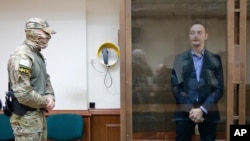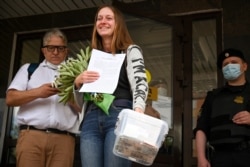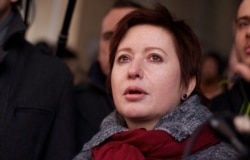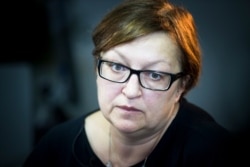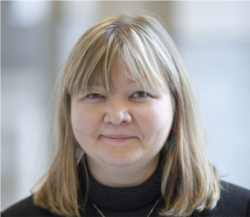WASHINGTON/ST. PETERSBURG — "For more than a decade I've seen how dramatically the space for independent journalism has been shrinking at the regional level," Moscow-based freelancer Artem Filatov told VOA.
Speaking ahead of a constitutional vote that gave President Vladimir Putin sweeping powers, the former Echo of Moscow radio journalist said, "There is little critical reporting toward Putin's system. And many Moscow-based media are also under control [of the state or state-aligned corporations]."
Since Putin came to power in 2000, Russia has moved to limit news media and critics. Steps have included passage of a 2014 law threatening bloggers and a 2019 law to control the internet, plus measures on extremism, foreign interference and false news that can be used to punish journalists.
Media buyouts by state-owned companies or Putin supporters have led to journalists quitting over censorship. While some independent news outlets have survived or emerged, many are located overseas for protection from interference or retaliation.
Impunity has increased the sense of threat. Since January 2000, at least 25 journalists have been killed for their work, but full justice has been achieved in only one case — Anastasiya Baburova of Novaya Gazeta — according to a count by the press freedom group Committee to Protect Journalists (CPJ). A Moscow court in 2015 sentenced the leader of an extremist group to life in prison for her murder. Two others were convicted in connection with the killing 2011.
Gulnoza Said, head of the CPJ’s Europe and Central Asia program, told VOA she doubted Moscow would change course after the constitutional vote. “The Kremlin is not likely to ease its policy of suppressing independent media,” she said.
Her concerns appear to have been realized. Since the July 1 vote, Russia has seen a rash of high-profile arrests and convictions, including former journalist Ivan Safronov, who is accused of treason, and Svetlana Prokopyeva, a freelancer convicted of “justifying terrorism.” Authorities on July 9 also raided the opposition group Open Russia and the media outlet MBKh Media.
Free speech – maybe
The current state of media freedom is a far cry from the rights enshrined in Russia’s Constitution, adopted in 1993, after the dissolution of the Soviet Union two years earlier. Article 29 of the Constitution guaranteed press freedom and prohibited censorship. But the freedoms did not last long.
"At first there were practically no restrictions, but then it very quickly became clear that there are different centers of power in the government, different centers of influence, different interest groups trying to control what could be reported in private or state-backed media,” Yevgeny Kiselyov, who ran the investigative news show Itogi on NTV, told VOA.
“And sometimes journalists lost this fight,” he said, referring to NTV’s 2001 takeover by the state-run gas monopoly Gazprom, which prompted Kiselyov’s departure and signaled what he called the “creeping strangulation” of press freedom.
For Olga Romanova, a former anchor for the daily flagship news show on the independent network REN-TV, the censorship was more direct. “The turning point for me personally was 2005, when I was forbidden to say anything on air by direct order from the Kremlin," she said.
Romanova was fired that year after the network was bought out by the media arm of German conglomerate Bertelsmann and a subsidiary of Severstal, Russia's second-largest steel company.
“Everything just collapsed like dominoes after that,” Romanova said.
The journalist now runs the prisoner rights group Rus Sidyashchaya (Russia Behind Bars) from Berlin. She left Russia in 2017 after authorities accused her of embezzling state funds — a charge she denies.
Such takeovers by state-run companies or Putin allies are a common tactic employed against the independent media.
Putin used a presidential decree in 2013 to dissolve Ria Novosti, a state news agency described by The New York Times as “semi-independent.” In 2017, the privately owned RBC media group, which investigated businessmen with ties to Putin, was sold to the owner of a tabloid that is deferential to the Russian leader. And more recently, a takeover at the leading business newspaper Vedomosti and appointment of a new director led five senior editors to quit over what they said were changes to coverage.
Critical journalists also risk being dismissed, replaced or accused of crimes.
Galina Timchenko, founder of the Latvia-based Russian news website Meduza, said Russia’s laws allow authorities to pursue people “at any time, for any reason.”
"They have more and more leverage,” said Timchenko, whose 15-year run at the independently run website Lenta concluded in 2014. She was dismissed after the state media regulator issued a warning to the news site about publishing extremist material after it ran an interview with a far-right Ukrainian nationalist. Timchenko was replaced with an editor who worked for a pro-Kremlin news outlet.
Several of the site’s journalists resigned to help Timchenko found Meduza.
“We — all independent media — are walking through a minefield. Who will be blown up? Who will be saved by fate or luck? Decisions are not made on the basis of laws, and they can write anything into the laws,” she said.
Digital frontiers
As space for traditional independent media shrank, more journalists like Timchenko turned to digital platforms to challenge the Kremlin narrative, often from outside Russia’s borders.
Said, CPJ’s Russia expert, told VOA that digital news sites are a sign of hope, except that authorities are finding ways to gag them. “Russian journalists working from abroad see this as the only way to secure their independence,” she told VOA.
Expanding laws to combat extremism and false news and adding to regulations on the internet have “made it practically impossible for a media outlet to stay afloat financially and remain safe physically and digitally,” she said.
Timchenko said there were benefits to being based outside Russia, but it didn’t remove all risks.
“I am not afraid that my bank account will be frozen, that the fire department and the tax inspectorate will come after me,” she said.
But, she said, “we are also under threat. At any moment, they can block us, declare us an ‘undesirable organization’ or do anything they please."
Timchenko said that half of the news outlet’s journalists work in Moscow and that Meduza has tried three times to register as a foreign outlet with the Foreign Ministry. So far, the ministry has not responded to its applications.
“This does not prevent us from working, but it does prevent Russian authorities from giving us official comments,” Timchenko said.
Russian freelancer Filatov said he expected that more journalists would go online to survive.
"Such media are much smaller than state-controlled giants, but they provide quality journalism and the Kremlin often has to react to their stories," Filatov said.
He highlighted how outlets including Proekt, The Bell and other startups such as Mediazona, TV Rain, the Redaktsia YouTube channel, and 7x7 Journal, are run by individuals or small groups of former state media journalists or freelancers. Often they focus in depth on one topic or issue, such as the coronavirus pandemic.
Independent vloggers like Yury Dud, he said, have produced hard-hitting documentary-style reports.
Dud's two-hour documentary, HIV In Russia, the Epidemic No One’s Talking About, has been viewed 18 million times since it posted on February 11. Within 48 hours, Google searches for Russian terms relating to HIV tests rose 5,500 percent worldwide, which The Moscow Times attributed directly to Dud's report.
Russian media historian Nataliya Rostova said these niche digital startups may be outperforming their '90s-era counterparts.
"There are some small teams in Moscow, and certainly in regions outside of Moscow, which are still doing a good job — perhaps even better than journalists did 20 years ago, because they are more sophisticated in the ways of producing an investigation, and they've acquired more skills during that time,” said Rostova, a former senior correspondent for Republic.ru, who contributes to the Kennan Institute Russia File blog at the Washington-based Wilson Center research group.
Rostova, who operates two Kennan-supported archives — the Glasnost-era Birth of Russian Media and the Russian President Boris Yeltsin-era Heyday of Russian Media — warned, however, that “the power and possibilities of the state remain great.”
This story originated in VOA's Russian service. Anna Plotnikova reported from St. Petersburg, Russia. Alex Gorbachev contributed reporting from Washington.




